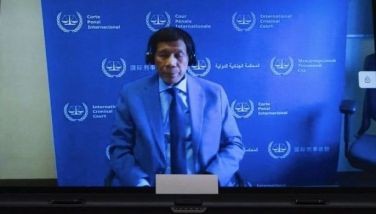Military: Hapilon, Maute deaths may turn terrorists 'more violent'

Image taken while bodies of slain terrorists, including that of Omar Maute, in Marawi City are being retrieved by the military on Monday, Oct. 16, 2017. Military sources
MANILA, Philippines — The deaths of two top leaders of the ISIS-linked terrorist group that overran Marawi City could make their followers more violent, the military said on Tuesday.
Military sharpshooters killed Abu Sayyaf leader Isnilon Hapilon and Omarkhayam Maute, one of two Middle East-educated heads of the Maute terror group, in a pre-dawn operation on Monday.
?READ: Hapilon, Maute killed
While the killing of two notorious militants is seen to hasten the liberation of the Muslim-majority city, Maj. Gen. Restituto Padilla Jr. —Armed Forces of the Philippines spokesperson — said the deaths of Hapilon and Maute could push the members of the extremist group to more violence.
“It can be twofold—both positive and negative. But the negative side is they lost two prominent leaders that have been there for a long, long time and who have provided a lot of direction,” Padilla said in an interview with CNN Philippines.
“Second, on the negative side, it can spur them to be more violent, be more extremist in their ways,” he added.
The Marawi battle, which broke out on May 23, has so far left more than 800 militants, 162 government forces and 47 civilians dead, according to authorities.
The clashes erupted following a foiled attempt by security forces to arrest Hapilon, linked to high profile Abu Sayaaf terror activities including kidnapping and beheading of foreigners.
The bloody siege prompted President Rodrigo Duterte to place the entire Mindanao region under martial law and order aerial and artillery bombing of the enemies’ positions, sending them into retreat but leaving the city in ruins.
New terrorist leader 'coming up'
According to Padilla, there is an attempt to “build back” the gunmen’s “dwindling” forces, adding that such a move is “something that we have to work on together as a whole country.”
The military spokesman also said that although there is no known personality yet with the “caliber” of Hapilon and the Mautes who can take on the helm of the militant alliance, “definitely there will be one coming up.”
“We really can’t tell at the moment who these personalities are,” Padilla said.
Another high profile militant still in the main battle area in Marawi is Malaysian Mahmud Ahmad, reportedly a recruiter and financier of ISIS in the Philippines.
Eight other foreign terrorists – mostly Indonesians and Malaysians – are believed to be still holed up in Marawi, authorities said.
In a press conference in Malacañang also on Tuesday, Padilla said the military is still uncertain if Mahmud Ahmad will be appointed as the new leader of jihadist fighters in the southern Philippines.
“We will find out from developments in coming days. Operations in parts of Marawi are focused on getting him (Mahmud Ahmad) and his comrades,” Padilla said in Filipino.
In a report by Agence France-Presse, Kumar Ramakrishna, a terrorism expert from Singapore’s S. Rajaratnam School of International Studies, said that while the death of Hapilon is a “symbolic blow” to ISIS-linked groups in Mindanao, the extremists remain a potent threat in the Philipines and Southeast Asia.
READ: ‘IS still a threat in Southeast Asia’
“Just because the Marawi siege is coming to an end does not mean the threat is over. IS-linked militants there will regroup... and lay low for a while, while rebuilding their strength,” he said, adding that Mahmud Ahmad may lead the ISIS-affiliated militants in Mindanao and stay in contact with the jihadists in the Middle East.
Malacañang earlier announced a P10-million bounty for Hapilon and P5 million each for Maute brothers Omar and Abdullah. Abdullah was believed to have been killed in September.
The United States had a $5-million bounty for Hapilon, said to be the anointed emir of the IS “caliphate” in Southeast Asia.
Aside from the killing of Hapilon and Maute, Monday’s military operations also led to the rescue of 17 hostages.
- Latest
- Trending
































